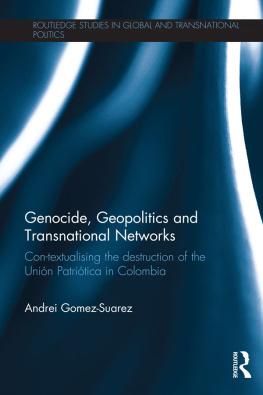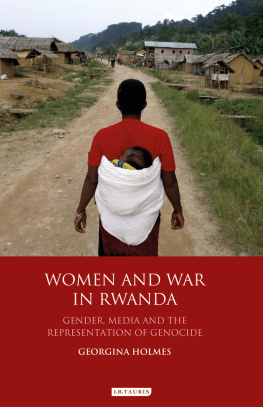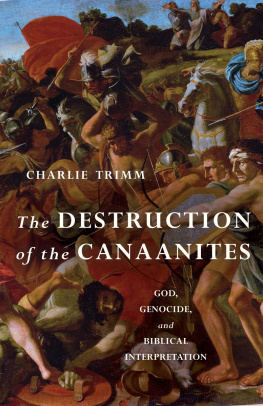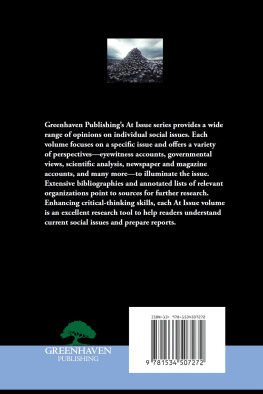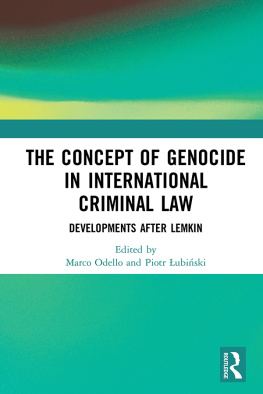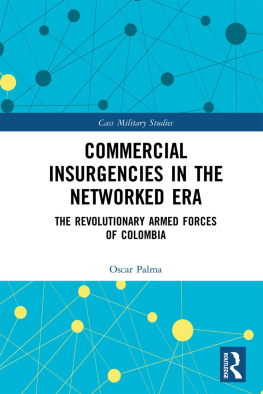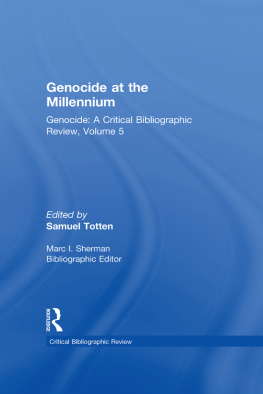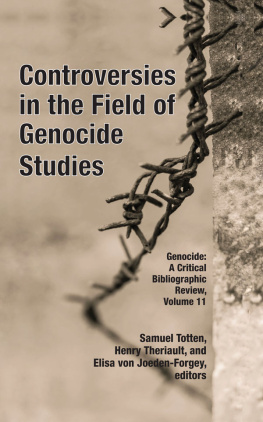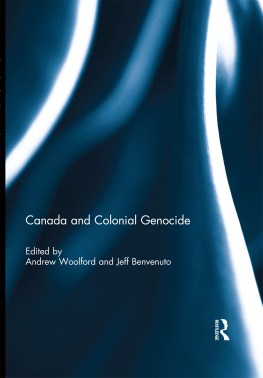A highly original, well researched and provocative re-reading of what the author calls the global genocide script. Genocide is contextualised and explored through the complex dynamics surrounding the systematic killing of members of the Patriotic Union in Colombia. Both this dark period in Colombias history and the meanings attached to genocide are illuminated.
Jenny Pearce, Professor of Latin American Politics, University of Bradford, UK
Andrei Gomez-Suarez maps the historical and political terrain leading to and following the annihilation of the Union Patriotica (UP). He reveals the usual suspects and the strange bedfellows allied in the politicide that set back the country in its earlier peace efforts. This book is an important reference for understanding the complexity behind Colombias history of armed conflict and its struggle for peace.
Leigh Payne, Professor of Sociology of Latin America and Director of the Latin American Centre, University of Oxford, UK
Genocide, Geopolitics and Transnational Networks
This volume seeks to uncover and discuss the links between genocide, geopolitics and transnational networks. By studying the destruction of the Unin Patritica (UP) in Colombia a process usually regarded as one of the extreme by-products of the Colombian armed conflict through the lens of genocide studies, Gomez-Suarez challenges mainstream international relations, genocide and Colombian armed conflict studies.
Moving beyond the analysis of the Colombian case, the book offers a broader interdisciplinary theoretical framework that also attends to transnational relations of perpetrators and resisters and the political economy of affective dispositions for mapping genocidal conjuncture. Methodologically, the text aims to present a reinterpretation of what constitutes genocide, beyond its legal definition, and to turn towards its political and ethical dimensions to create a conceptual framework in which genocide appears to turn ever more in a decentralised network of various actors that contributed to a genocidal mentality, which, ultimately, enabled the destruction of civil society networks.
This work will be an important contribution to both the debates on genocide and international relations and the study of global connectivities.
Andrei Gomez-Suarez is a Researcher for the National Centre for Historical Memory of the Department of Social Prosperity of the Colombian Government, member of the Sussex Centre for Conflict and Security Research (SCSR), Rodeemos el Dilogo (ReD), and founding member of British Academics for a Colombia Under Peace (BACUP). During 2013 and 2015, Andrei is Research Associate at the Centre for Criminology at the University of Oxford which hosts the Oxford Transitional Justice Research (OTJR) network.
Routledge Studies in Global and Transnational Politics Series
Series editors: Chris Rumford, Sandra Halperin
Royal Holloway, University of London, UK
The core theme of the series is global connectivities and the implications and outcomes of global and transnational processes in history and in the contemporary world. The series aims to promote greater theoretical innovation and inter-disciplinarity in the academic study of global transformations. The understanding of globalisation that it employs accords centrality to forms and processes of political, social, cultural and economic connectivity (and disconnectivity) and relations between the global and the local. The series editors see the multi-disciplinary exploration of global connectivities as contributing, not only to an understanding of the nature and direction of current global and transnational transformations, but also to recasting the intellectual agenda of the social sciences.
The series aims to publish high-quality work by leading and emerging scholars critically engaging with key issues in the study of global and transnational politics. It will comprise research monographs, edited collections and advanced textbooks for scholars, researchers, policy analysts, and students.
Genocide, Geopolitics and Transnational Networks
Con-textualising the destruction of the Unin Patrtica in Colombia
Andrei Gomez-Suarez
Genocide, Geopolitics and Transnational Networks
Con-textualising the destruction of the Unin Patrtica in Colombia
Andrei Gomez-Suarez
First published 2015
by Routledge
2 Park Square, Milton Park, Abingdon, Oxon OX14 4RN
and by Routledge
711 Third Avenue, New York, NY 10017
Routledge is an imprint of the Taylor & Francis Group, an informa business
2015 Andrei Gomez-Suarez
The right of Andrei Gomez-Suarez to be identified as author of this work has been asserted by him in accordance with the Copyright, Designs and Patent Act 1988.
All rights reserved. No part of this book may be reprinted or reproduced or utilised in any form or by any electronic, mechanical, or other means, now known or hereafter invented, including photocopying and recording, or in any information storage or retrieval system, without permission in writing from the publishers.
Trademark notice: Product or corporate names may be trademarks or registered trademarks, and are used only for identification and explanation without intent to infringe.
British Library Cataloguing in Publication Data
A catalogue record for this book is available from the British Library
Library of Congress Cataloging in Publication Data
Gomez-Suarez, Andrei.
Genocide, geopolitics and transnational networks : con-textualising the destruction of the Union Patrotica in Colombia / Andrei Gomez-Suarez.
pages cm
Summary: This volume seeks to uncover and discuss the links between genocide, geopolitics and transnational networks-- Provided by publisher.
Includes bibliographical references and index.
1. Unin Patritica (Colombia) 2. Political parties--Colombia. 3. Victims of state-sponsored terrorism--Colombia. 4. Genocide--Colombia. 5. State-sponsored terrorism--Colombia. I. Title.
JL2898.U57G66 2014
324.286607--dc23
2014022497
ISBN: 978-1-138-78916-6 (hbk)
ISBN: 978-1-315-76502-0 (ebk)
To the memory of my Mum,
Alix Cecilia Surez Vargas
19422011
Contents
Decades after the end of the Cold War, people live amidst messy patterns of armed conflict in many parts of the world. Targeted violence against civilians is all too commonplace and much of it is thanks to global communications visible even to those in the safe richer regions. It is easy to see this violence as a feature of a new age of local conflicts and global networks, but it has many antecedents in the previous period. The Cold War was more than a frozen stand-off between two Northern superpowers and blocs: its systems of patronage on a world scale fed hot Southern conflicts, every bit as messy and atrocity-strewn as those we see today. The end of the Cold War did not plunge us into a previously unknown pattern of violence, however much it might have seemed like that to North Americans and Europeans. It did, however, liberate us from the idea that the only atrocity that mattered was the nuclear holocaust threatened by superpower rivalry, and it opened up a much deeper and broader study of violence. The expansion of this field was informed partly by new violence in places like Yugoslavia, Rwanda and Darfur, but also by new awareness of historical atrocities, ranging from the Nazi genocide to the extermination of indigenous peoples during colonisation. Last but not least, the field has returned to the systematic violence against civilians during the very recent past, which was nowhere (except in East Asia) more connected to the Cold War system than in Latin America. The shockingly targeted killings, which began only in the last decade of the Cold War and continued into the early 2000s, were directed not only against leaders and members but also against their families and local communities in which the UP was influential.

